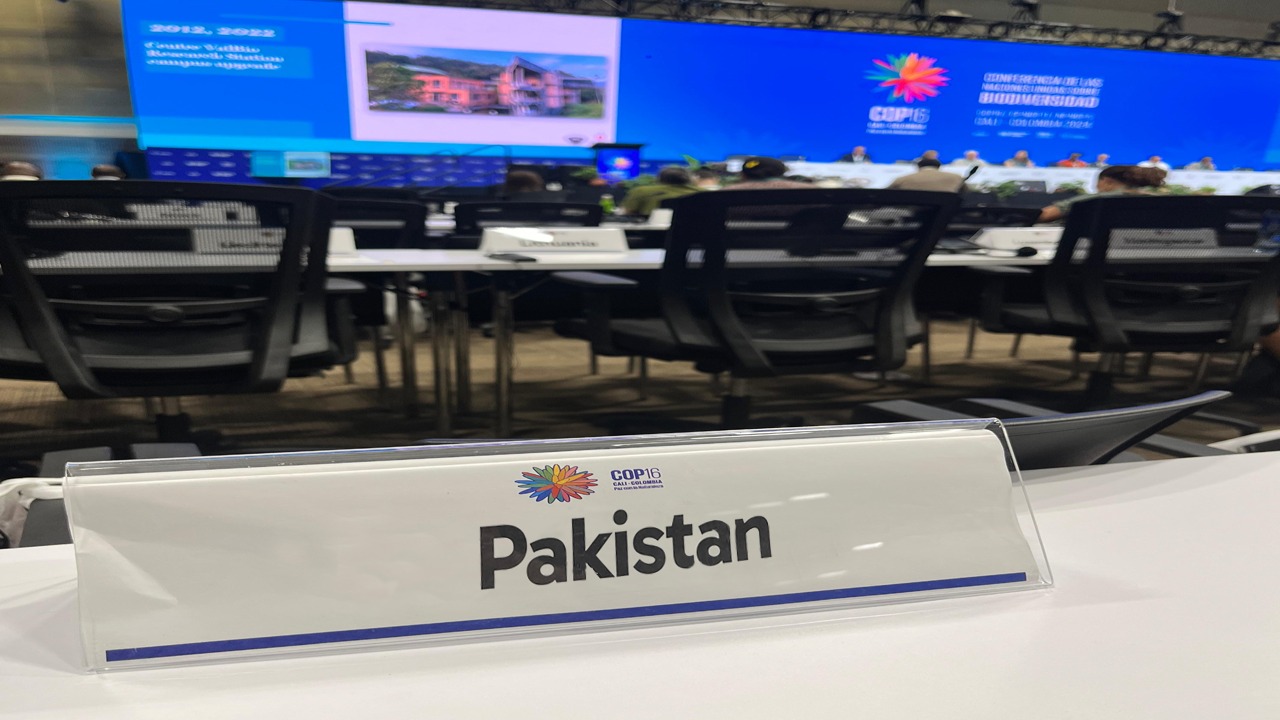CALI, OCT 23 — Pakistan will not be submitting its updated National Biodiversity Strategies and Action Plans (NBSAPs) in line with the Kunming-Montreal Global Biodiversity Framework (KMGBF) at the 16th Conference of the Parties under the Convention on Biological Diversity 16 (CBD COP16). Biodiversity is crucial for Pakistan, given its diverse ecosystems that support agriculture, livelihoods and climate resilience.
Recognized as the world’s paramount event for biodiversity conservation, the CBD COP16 summit is taking place in Cali, Colombia, for two weeks until November 1. Aiming to protect ecosystems and strengthen global environmental policies, COP16 follows the KMGBP, a landmark plan to halt and reverse biodiversity loss by 2030, adopted at COP15 Canada.
At the time of filing this report, 35 countries have submitted their updated NBSAPs on the CBD website and 112 have submitted their updated national targets aligned with the KMGBF. In South Asia, only Afghanistan and China have submitted their updated plans. India is expected to submit its updated plans sometime during the summit, according to David Ainsworth, information officer at the United Nations Environment Programme (UNEP). Pakistan has submitted its national targets but they remain part of the old NBSAP.
Pakistan is represented by Naeem Ashraf Raja, director of the Biodiversity Programme at Ministry of Climate Change (MoCC) who said the UNDP is solely managing the development of the updated NBSAPs, leaving Pakistan without control over it.
Pakistan’s biodiversity efforts
Under the convention, many countries, including Pakistan, formulated their first-generation Biodiversity Action Plans to be achieved by 2010. However, the Global Biodiversity Outlook published by the CBD noted that these targets were not met globally.
In 2010 at the 10th CBD in Aichi Prefecture, Japan, the Strategic Plan for Biodiversity 2011-2020 was adopted, introducing the Aichi Biodiversity Targets (ABTs) which included five strategic goals and 20 sub-targets to be achieved by 2020.
Sub-target 17 required each nation to develop and adopt an updated national biodiversity strategy and action plan by 2015. These ABTs were also reflected in the 17 Sustainable Development Goals (SDGs), formulated in the United Nations Sustainable Development Summit in 2015.
Pakistan, in 2017, developed its second NBSAP for 2017-2030, aligning with ABTs and SDGs to achieve the CBD’s objectives.
KMGBF adoption & targets
During the CBD COP15 in 2022, all countries agreed to the KMGBF by consensus. This framework followed the publication of the fifth edition of the Global Biodiversity Outlook which highlighted unprecedented rates of global diversity decline despite ongoing efforts.
The KMGBF is based on the Strategic Plan for Biodiversity 2011–2020, Aichi Biodiversity Targets goals and is in line with the Sustainable Development Goals. The framework envisions a world by 2050 where “biodiversity is valued, conserved, restored and wisely used, maintaining ecosystem services, sustaining a healthy planet and delivering benefits essential for all people”. It includes four long-term goals to be achieved by 2050 and 23 action-oriented global targets for 2030.
According to Section J of the framework, countries must update their NBSAPs and set specific targets aligned with the KMGBF. The CBD COP15 decision titled “15/6 mechanisms for planning, monitoring, reporting and review” requests countries to revise and update their NBSAPs in line with the KMGBF’s goals and targets by COP16.
NBSAP Forum & Pakistan
To support 138 developing countries in forming and implementing their NBSAPs post-COP15, the NBSAP Forum — a global partnership between CBD, United Nations Development Programme and UNEP — developed the Global Biodiversity Framework Early Action Support (GBF-EAS) programme. Funded by the Global Environment Facility (GEF), this initiative provides the 138 countries financial resources to address critical environmental issues. The implementation of the NBSAP Accelerator Programme is divided between UNDP and the United Nation Enivornment Programme, with Pakistan falling under the UNDP.
The GBF-EAS focuses on four components:
1. Aligning targets: Updating existing NBSAP targets to align with the KMGBF.
2. Monitoring action plan: Develop a monitoring framework for these targets.
3. Policy alignment: Adjusting existing policies and laws to match with the KMGBF and updated NBSAP targets.
4. Financial allocation: Determining national and international funding for each updated target and identifying any funding gaps.
Raja, CBD’s focal person for Pakistan, told The Citizenry that under the UNDP’s GBF-EAS programme, they are formulating 18 targets aligned with the Kunming-Montreal Global Biodiversity Framework and creating a monitoring framework for each updated target.
Raja said a revised NBSAP would outline the action plans for Pakistan’s provinces and biodiversity-related departments once all four components are completed. Following the 18th Amendment to Pakistan’s Constitution, provincial consent is required for the realigned targets.
He expressed dissatisfaction with UNDP’s Direct Implementation Modality, which involves assuming overall management responsibility and accountability for the project. Raja said the UNDP has managed all aspects, from hiring consultants to overseeing project phases. Currently, the United Nations Development Project-hired consultants have shared the realigned targets draft reports with the Ministry of Climate Change, and are awaiting provincial feedback. Onno van den Heuvel, UNDP’s Biodiversity Initiative global manager said that in this modality, UNDP plays a more central role but national stakeholders provide oversight through a steering committee.
UNEP’s Ainsworth stressed that countries can update their NBSAPs according to their needs, provided they align with the KMGBF and involve stakeholders and groups.
Header image by Oonib Azam
Subedited by Maleeha Hamid Siddiqui
This story was produced as part of the 2024 CBD COP16 Fellowship organized by Internews’ Earth Journalism Network.




Really nice story Onnib, thumbs up 👍
Keep up the great work